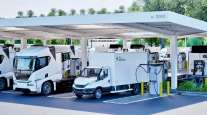Staff Reporter
Transportation Measures Find Success on State, Local Ballots

[Stay on top of transportation news: Get TTNews in your inbox.]
Voters resoundingly supported ballot measures that would boost state and local transportation funding during the recent election.
Voters in 19 states approved 270 transportation initiatives Nov. 5, according to the Transportation Investment Advocacy Center. The group, a component of the American Road and Transportation Builders Association’s Transportation Makes America Work program, tracked 305 ballot measures, meaning 89% were approved.
TIAC Director Carolyn Kramer said 89% is the highest approval rating the center has recorded for such transportation measures. Kramer spoke at a TIAC webinar Nov. 8.
The 305 ballot measures tracked this fall mark the largest number for an odd-number, off-year election. According to TIAC, the approved initiatives are projected to generate more than $9.6 billion in revenue.

Kramer
“Those local measures really demonstrate voter support for the transportation infrastructure they use on a daily basis,” Kramer said. “It was a good year overall for transportation investment.”
Maine voters approved a $105 million bond measure for infrastructure projects. The measure, which was approved with 76% of the vote, marks Maine’s seventh successful transportation bond in eight years.
In San Francisco, voters approved a tax on ride-sharing companies Uber and Lyft to support public transportation and pedestrian infrastructure.
Elsewhere, Washington and Colorado voters made a pair of decisions that will limit transportation funding in those states.
In Washington, voters approved by 54% a measure that limits certain motor vehicle taxes and fees and repeals the authority of certain transit agencies to impose motor vehicle excise taxes.
TIAC estimates the decision will cost the state nearly $4.3 billion in transportation revenue over the next six years. Washington Gov. Jay Inslee issued a statement Nov. 6 ordering the Washington State Department of Transportation to postpone projects that are not yet underway.
“It’s definitely going to be a significant impact on Washington state,” Kramer said.
Colorado constituents rejected by 54% of the vote a measure that would allow the state to retain revenue above the state spending cap to fund transportation and education.
Kramer pointed out this election marked the second attempt in two years to raise transportation revenue in Colorado. In 2018, both transportation measures on the Colorado ballot failed. One would have authorized up to $3.5 billion in bonds for statewide transportation projects. The other would have authorized a 0.62-cent increase in the state’s sales and use tax for the next 20 years and would have allowed the Colorado Department of Transportation to issue bonds up to $6 billion.

Beshear
Two new governors were elected Nov. 5. In Mississippi, Tate Reeves, who serves as lieutenant governor, was elected. In Kentucky, Andy Beshear barely defeated incumbent Matt Bevin.
In August, Beshear released a transportation infrastructure plan listing the construction of a bridge to carry Interstate 69 across the Ohio River, linking Kentucky and Indiana, as a top priority. However, Beshear has not identified a funding source for the project.
Reeves has opposed raising the fuel tax rate, which is 18 cents per gallon for diesel and 18.4 cents per gallon for gas.

Reeves
Kramer said the election results demonstrate a trend of transportation measures finding success at the state and local level. Over the past decade, TIAC reported 1,963 state and local transportation measures have been finalized (an 81% approval rate), resulting in $304.5 billion in approved revenue.
“As we’ve tracked over the past decade, we have seen a small amount of revenue here and there really adding up,” Kramer said.
Want more news? Listen to today's daily briefing:




